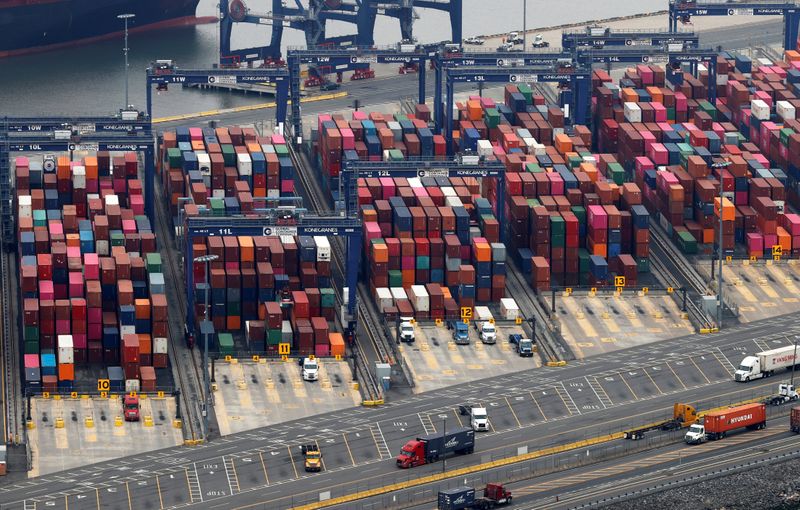By Lucia Mutikani
WASHINGTON (Reuters) - U.S. import prices dropped by the most in more than five years in March amid declines in the costs of petroleum products and a range of other goods, pointing to import deflation that could deepen amid the coronavirus pandemic.
The report from the Labor Department on Tuesday followed data last week showing the biggest decline in the consumer price index in more than five years as state and local governments adopted stiff measures to control the spread of COVID-19, the respiratory illness caused by the coronavirus, virtually grounding the country and sending the economy into a tailspin and millions out of work. Producer prices also fell in March.
"Import prices remain firmly in deflation," said James Watson, a senior U.S. economist at Oxford Economics in New York. "A strong dollar, low oil prices and a global recession will keep them that way."
Import prices dropped 2.3% last month, the largest decline since January 2015, after a downwardly revised 0.7% drop in February. Import prices, which exclude tariffs, were previously reported to have decreased 0.5% in February.
Economists polled by Reuters had seen import prices tumbling 3.2% in March. In the 12 months through March, import prices plunged 4.1%. That was the biggest drop since June 2016 and followed a 1.3% decline in February.
Import price data is collected on the first day of the month. The Labor Department said while not directly related to the coronavirus pandemic, response rates for March were approximately 6.5 percentage points lower than March 2019.
Restrictions on social movements to curb the spread of COVID-19 have greatly suppressed demand, leading to slumping gasoline prices and record decreases in the costs of hotel accommodation, apparel and airline ticket prices.
At the same time, the prospects of a deep global recession and an oil price war between Russia and Saudi Arabia, which has since been resolved, have sent crude prices tumbling.
BROAD PRICE DECLINE
The dollar has gained about 7.1% against the currencies of the United States' main trading partners this year. These factors are seen offsetting price increases caused by bottlenecks in the supply chain.
"We look for the headline U.S. CPI to drop below 0.5% on a year-ago basis in the second quarter and remain there through the rest of this year," said Ryan Sweet, a senior economist at Moody's' Analytics in West Chester, Pennsylvania. "We also expect a noticeable deceleration in the core CPI this year."
U.S. stocks were trading higher as the quarterly earnings season kicked off. The dollar fell against a basket of currencies, while Treasury prices rose.
In March, prices for imported fuels and lubricants dropped 26.8%, the most since November 2008, after diving 9.0% in February. Petroleum prices tumbled 27.4% last month after dropping 8.8% in February. Imported food prices fell 1.0% last month. That followed a 1.3% jump in February.
Excluding fuels and food, import prices edged up 0.1% last month, matching February's gain. The so-called core import prices fell 0.6% in the 12 months through March.
The cost of goods imported from China edged up 0.1% in March after decreasing 0.3% in the prior month. Prices declined 1.2% year-on-year in March.
Last month, prices for imported capital goods edged up 0.1%, matching February's gain.
The cost of imported motor vehicles shot up 0.4% after being unchanged in February. But prices for consumer goods excluding autos dropped 0.3% in March after being unchanged in the prior month, pointing to weak core consumer prices.

The report also showed export prices dropped 1.6% in March, the largest decline since January 2015, depressed by decreases in prices for agricultural and nonagricultural products. That followed a 1.1% drop in February. Export prices fell 3.6% on a year-on-year basis in March, the largest decrease since May 2016. Export prices dropped 1.3% year-on-year in February.
